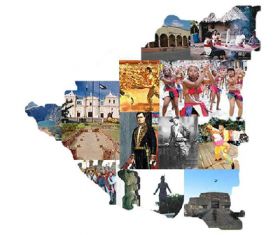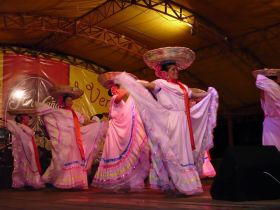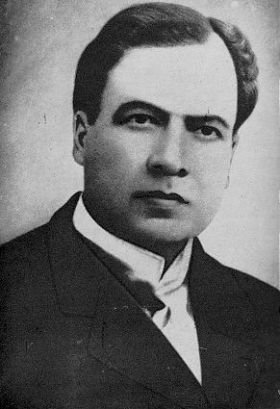What is the culture of Nicaragua?
Roxanna Zelaya
Nicaragua, wich means “here united with water”, is a sovereign state whose people love freedom and Independence. The merging of different cultures within Nicaragua has caused the dawn of a creative, lively and blissful culture. Nicaraguans are appreciated for their natural warmth, hospitality and wisdom.
The country is known as the land of poets, and Nicaraguan poet Ruben Dario is the father of Spanish-American literary movement,...
Nicaragua, wich means “here united with water”, is a sovereign state whose people love freedom and Independence. The merging of different cultures within Nicaragua has caused the dawn of a creative, lively and blissful culture. Nicaraguans are appreciated for their natural warmth, hospitality and wisdom.
The country is known as the land of poets, and Nicaraguan poet Ruben Dario is the father of Spanish-American literary movement, Modernism. The rhythmic marimbas and folkloric dances give vibrancy to our fiestas across the country and the beautiful work of our skilled artists spreads and understanding of our history and nature. 

Posted July 25, 2014
Elizabeth Samayoa - Bosa Tours and Travel

Nicaragua has a rich and interesting culture; its culture is the result of a mix among natives, Spaniards, and Africans hundreds of years ago. However, the culture in Nicaragua has evolved and there have been some variations in its traditions, gastronomy, national dances, and music.
Nicaragua is a Catholic country with multiple religious festivities all year; among them are the December celebrations to the Virgin named "Purisimas", Christmas Eve on...

Nicaragua has a rich and interesting culture; its culture is the result of a mix among natives, Spaniards, and Africans hundreds of years ago. However, the culture in Nicaragua has evolved and there have been some variations in its traditions, gastronomy, national dances, and music.
Nicaragua is a Catholic country with multiple religious festivities all year; among them are the December celebrations to the Virgin named "Purisimas", Christmas Eve on December 24th, New Year's Eve on December 31st; Holy Week, Cities Patrons Saints celebrations, and more.
Nicaragua’s gastronomy is delicious. The most known dishes are the famous Gallo Pinto (fried rice and red beans), Quesillo (special cheese in a tortilla with cream and chopped onion), Vigorón (yucca, chicharrón, and cabbage salad), Nacatamal (boiled dough with rice, meat and vegetables), Rosquillas (corn dough appetizers or snacks), and much more.
Dances and music are entertaining and splendid; they vary depending on the zone (Pacific, Central, or Atlantic Zone). In the Pacific, music is composed by flute and drums; dancers wear Spanish clothing. In the Central Region, famous dances are the “polcas” and “mazurcas”. The Caribbean Region is best known for its “Palo de Mayo”, dance of African influence.
Posted August 5, 2014
John-Marc Gallagher - GPS Real Estate
I just finished a book on North American Indians and their whole concept of stealing is completely different from ours. It was interesting to see how the white man in the 1800s dealt with the Indian mentality of this situation:
“You left your horse in the field, you weren’t using the horse, and I needed a horse so I took it. I have not brought it back yet because I still need it.”
“You stole my...
I just finished a book on North American Indians and their whole concept of stealing is completely different from ours. It was interesting to see how the white man in the 1800s dealt with the Indian mentality of this situation:
“You left your horse in the field, you weren’t using the horse, and I needed a horse so I took it. I have not brought it back yet because I still need it.”
“You stole my horse.”
“No, I didn’t. I took it but you weren’t using it.”
It is the same here in Nicaragua. If there is an open plot of land and you are not using it, someone is going to move on to it. If you are not using your truck for a week or two and the bed has been empty, you will find someone using the bed of your truck to store their vegetables.
It does not only happen that way here in Nicaragua. It also happens that way in Egypt, Turkey, and with the North American Indians. The concept of lying, cheating, and stealing is completely different. So you should not get angry if someone uses your truck that you are not using because that is the culture here. If you have a vacant lot and you are not using it, someone can use it, and as long as he does not damage it, it is fine. He may put a vegetable stand there or he may build a shack and live on it for ten or twenty years.
The sense of space is different, too. We have talked about that in our culture class many times. If two persons are having an argument whether it be between husband and wife or two men in the gym and they say “Respect my space”, “Give me my space”, or ‘You’re too close to me when you’re talking to me”, if you were in American, you will back up and give the other person his or her space. It is not like that here in Nicaragua. Here, everyone has so little space that we are elbow to elbow or butt to cheek.
Another perfect example is my pick-up truck. In the US, try having ten or twenty kids jump into the bed of a truck someone has parked at a fair. Then wait for the owner to come back and watch what the owner does. He will go ballistic when he sees the kids standing up on his pick-up truck looking down on an event. It is not the same here in Nicaragua. One time, I was parked on the street and there was a religious procession going down that street. Fifteen kids jumped in the back of my pick-up truck so they could get a better vantage point. My immediate reaction was, “That’s private property. You have touched my truck. Get out of my truck!” Then I realized, they are not doing any damage to my truck and to them, it is open space. So, here, I would just say, “Hey kids, I am driving away now. Will you jump out of my truck?” They will say, “Oh, okay. I’m sorry.” Then they will jump out of my truck, I will get in, start the truck, and drive away.
So, the sense of space, the sense of use, and the sense of ownership is different here in Nicaragua.
The Nicaraguan culture is very family oriented. Every culture will say that they are family oriented but here in Nicaragua, they put rhetoric into practice. The family is not only all-important but the family also takes care of each other. Therefore, it is not unusual to see two, three, or four generations of families living in the same household. It is not unusual for an ageing mother or an ageing aunt to still live at home. They take care of the mentally challenged. There are not too many schools or hospitals that will take on mentally challenged patients, so the family is responsible for taking care of them. It is actually very warming to see that.
In my own personal experience, right now, my mother is eighty-two, she is starting to suffer from mild dementia, and we were talking about putting her in assisted living. That kind of conversation would never take place in this culture and my mother, at eighty-two would not be living alone. Chances are, she would have one or two children living with her and one of those children would probably have a wife with children living with her. My mother’s house would be full with two or three generations of the family. That is how the culture is here in Nicaragua. It is actually very comforting and it is very nice to see multi-generational families still living together. It is something that I think has been lost in the American culture for a couple of generations or more.
Another cultural thing I learned about Nicaragua is that you cannot point to someone using your fingers. That is rude. They point with their lips. They purse their lips as if they are going to kiss you and they move the pursed lips left or right towards the direction they are pointing. It is funny and somewhat unusual but it is very Nicaraguan.
Posted September 27, 2014
Immanuel Zerger - Solentiname Tours - Discover Nicaragua
 Managua in general has a very cultural society. Everybody has some interest in culture. There are lots of painting galleries of different kinds. We have painting academies. You will also find lots of live music everywhere you go in Managua. You’ll see people playing guitars and marimbas in restaurants and bars.
Managua in general has a very cultural society. Everybody has some interest in culture. There are lots of painting galleries of different kinds. We have painting academies. You will also find lots of live music everywhere you go in Managua. You’ll see people playing guitars and marimbas in restaurants and bars. There is also a society of the Spanish language in Managua, the Academia Nicaraguense de la Lengua Española. We also have a community of writers...
 Managua in general has a very cultural society. Everybody has some interest in culture. There are lots of painting galleries of different kinds. We have painting academies. You will also find lots of live music everywhere you go in Managua. You’ll see people playing guitars and marimbas in restaurants and bars.
Managua in general has a very cultural society. Everybody has some interest in culture. There are lots of painting galleries of different kinds. We have painting academies. You will also find lots of live music everywhere you go in Managua. You’ll see people playing guitars and marimbas in restaurants and bars. There is also a society of the Spanish language in Managua, the Academia Nicaraguense de la Lengua Española. We also have a community of writers and poets, which is because the world famous Nicaraguan writer and hero Ruben Dario (pictured) left the country of Nicaragua a legacy. There is a yearly poetry festival in Granada and there is a Ruben Dario festival in Leon every year as well.
The Nicaraguan culture is a “narrative culture,” which means everything is relayed in a story, including, for example, the directions to a house. The way Nicaraguans point to a certain direction is by making a description of that direction; but not via technical information. The description of the direction is given by mentioning places that are known to most people, such as big buildings or trees in the area. For instance, you are looking for a certain house near Lake Managua, people will give you directions by saying, “Go from the little tree, then turn three quarters to the west, and one quarter to the north and you will find the house you are looking for.” The Nicaraguans have a descriptive and narrative culture that some people find very odd, but when they get used to it, the directions become interesting, because it is different.
Even the Nicaraguan dances tell a story. We have legends, too. Nicaraguans are very open in telling their life stories. And when they want to sell you something, they will also tell you a story.
Some lady in the market selling oranges might sell the oranges by saying, “Oh my love, how are you today? I see you are a little bit tired. I can help you by making orange juice out of these fresh oranges and you will be happy, strong and fit for the day again!”
This is normal and it is part of the narrative culture of Nicaragua. People make a story out of everything.
Posted January 28, 2015


